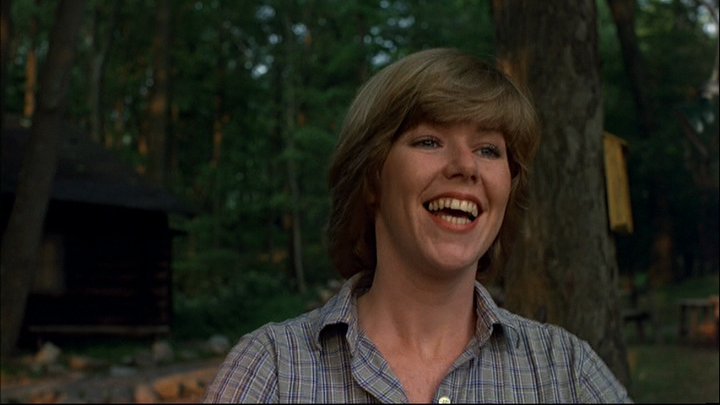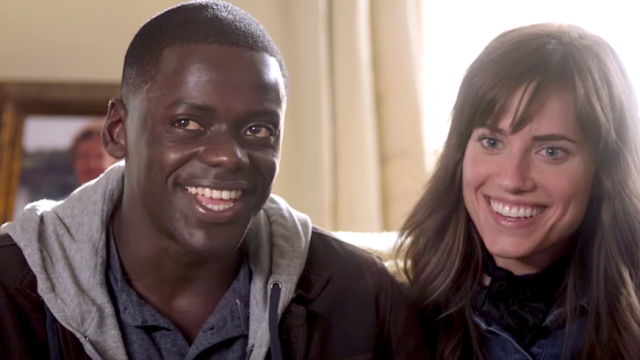Traditional horror movies have a survivor. Somebody has to live to tell the tale. Since the dawn of horror, the survivor is usually a single female, The Final Girl. When I ask you to think about The Final Girl, what do you think? Probably a mousey white girl with brown hair who would be gorgeous if only she had a better haircut and dressed like her now-dead friends. Admit it, it’s probably somebody close to Alice from Friday the 13th, with a tomboy haircut and flannel shirts who always has a smile on her face.

Or, maybe you’re thinking of Jamie Lee Curtis from the original Halloween, the mousey brunette with flat hair who wore cable knit sweaters and long necked undershirts. Or, maybe it was Marilyn Burns from The Texas Chain Saw Massacre, who had long stringy hair flat hair with little bounce and a boyish ringer tanktop. Whoever you were thinking of, they were probably some white girl, right? Even as movies advanced, and we got blonde survivors or big chested survivors, usually it was still a white girl who survived the movie. I mean, there are very few black girls in horror movies as it is. When black characters do exist, they are usually just meat for the grinder (see: Jada Pinkett’s character’s excellent take on this from the perspective of a black woman and then as the second character to die in Scream 2).
Jordan Peele knows and recognizes this. He kind of has to know this, as the excellent Get Out pivots on how race can be as performative as it is a skin tone. The whole first act and the final scene plays with various assumptions we have about race in horror movies and its relation to The Final Girl.
We the audience know we’re watching a horror movie, and the movie is set up with a black male, Chris Washington (Daniel Kaluuya), and a white female, Rose Armitage (Allison Williams), in an interracial coupling. Normally, interracial relations means that they’re both going to die, as horror movies usually set up and reinforce white heteronormative relations while punishing sex before marriage. While Rose is a happy and sassy white female who would normally be killed with Chris Washington, Peele also styles her as The Final Girl. She doesn’t dress provocatively, doesn’t have sex with Chris, wears boyish clothing, and even has flat brown hair. During the first act, while the Armitages are parading Chris around like their latest horse, she acts embarrassed and demure…aka mousey.
Peele uses these semiotic symbols to set up expectations that Rose could be a final girl. Let me correct that, Rose is using these semiotic symbols to set up expectations that she should be a final girl. Even after Chris discovers photographic evidence that Rose has been involved with the Armitage’s two black servants, he still doesn’t believe that she’s involved with the conspiracy to entrap black men and turn them into slaves. Even though we, the audience, know that Rose is now involved in his entrapment, Chris is still demanding Rose find her car keys so they can drive away from her crazy family. It’s only when Rose says “You know I can’t do that” that it becomes obvious to Chris that she is the killer posing as The Final Girl.
During the movie’s expected Final Run when Chris has to defeat his various foes and escape from the house of horrors, Rose is still left to play The Final Girl. The final sequence in Get Out pits the black male against the white female. Rose, in both Final Girl and Killer mode, is walking around with a shotgun trying to stop Chris from fleeing her family’s estate. After she’s been shot in the stomach, with two other dead characters lying in the road, Chris notices that she’s still alive…and intent on killing him.
Just as Chris The Black Guy is trying to strangle Rose The White Killer to death, the police show up. Suddenly Rose transforms back to Rose The Final Girl, fake crying her eyes out thankful for being rescued. Rose is not The Final Girl of Get Out. That would have been a deliciously sick joke, and one that might have started riots. The police officer is Chris’ TSA friend who has come to rescue him. But, the possibility that Rose could have been The Final Girl is still left in the audience’s mind. This ending could have been something totally different and still felt truthful.
Chris The Black Guy is actually Chris The Final Girl. He goes through everything that a final girl goes through. From being haunted throughout the first act by the eerie feeling that something is wrong and they should leave (see Friday the 13th and Halloween) to having to run through a haunted house of horrors and finding salvation in the middle of the public road where the horrors are now exposed to the public, Chris goes through every formula beat that The Final Girl has to go through.
In his own way, Chris also styled as a Black Male Final Girl. He has a passive, mousey demeanor, especially when compared to both Rose and his best friend Rodney. Rose shows spine when confronting the police after they hit a deer on their way up to the remote estate while Chris passively tries to follow orders. And, Rodney exhibits a more cliched black characterization of being a loudmouth who derides hypnotism and shouts SEX SLAVE to every revelation (in fact, Rodney’s reactions to Chris’ revelation that he had been hypnotized was reminiscent of the way The Nightly Show depicted black people responding to magic). Along with Chris’ mousey attitude, Peele puts Chris in neutral non-race specific clothing and gives him a boring trying-to-be-respectable haircut.
By the end of the movie, Daniel Kaluuya stands next to Marilyn Burns as a Final Girl covered in blood, chased by her killer, and rescued in the middle of the street by a passerby. Through his use of semiotics, Peele keeps the audience on edge by playing not just with race, but clothing and attitudes. If Chris and Rodney had switched places, would Rodney’s survival have played as truthfully? What if Chris was played as a more flamboyant Kanye-esque character? When Chris rifles through the photographs of Rose’s past relations, Peele is asking us to consider what about Chris makes him an appropriate Final Girl; what separates him from the various other black characters who didn’t make it out of the house with their minds in tact. In doing this, he also asks the audience what separates Chris from the rest of the final girls you’ve previously seen, and why could Rose be a final girl?

